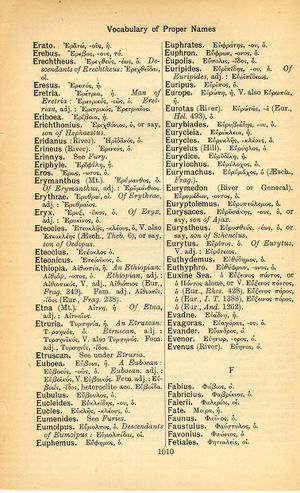Eumolpus: Difference between revisions
πᾶσα γυνὴ τοῦ λύχνου ἀρθέντος ἡ αὐτή ἐστι → all women are the same in the dark, all women are the same when the lights go out
m (Text replacement - "link={{" to "link={{") |
m (Text replacement - "}}]]" to "}}]]") |
||
| Line 1: | Line 1: | ||
{{WoodhouseENELnames | {{WoodhouseENELnames | ||
|Text=[[File:woodhouse_1010.jpg|thumb | |Text=[[File:woodhouse_1010.jpg|thumb | ||
|link={{filepath:woodhouse_1010.jpg | |link={{filepath:woodhouse_1010.jpg}}]]Εὔμολπος, ὁ. | ||
<b class="b2">Descendants of Eumolpus</b>: Εὐμολπίδαι, οἱ. | <b class="b2">Descendants of Eumolpus</b>: Εὐμολπίδαι, οἱ. | ||
Revision as of 10:10, 15 August 2017
English > Greek (Woodhouse)
Εὔμολπος, ὁ.
Descendants of Eumolpus: Εὐμολπίδαι, οἱ.
Latin > English (Lewis & Short)
Eumolpus: i, m., = Εὔμολπος,
I a fabulous Thracian singer and priest of Ceres, who brought the Eleusinian mysteries and the culture of the vine to Attica, Plin. 7, 56, 57, § 199.—His descendant of the same name, the son of Musaeus, Ov. M. 11, 93.—A sacerdotal family in Athens also bore, after him, the name Eumolpĭdae, ārum, m., Εὐμολπίδαι, Cic. Leg. 2, 14, 35; Nep. Alc. 4 al.
Latin > French (Gaffiot 2016)
Eumolpus,¹⁰ ī, m. (Εὔμολπος), Eumolpe [apporta en Attique les mystères d’Éleusis et la culture de la vigne]: Plin. 7, 199 ; Ov. M. 11, 93 || -ĭdæ, ārum, m., les Eumolpides [famille sacerdotale d’Athènes chargée du culte de Cérès] : Cic. Leg. 2, 35 ; Nep. Alc. 4, 5.
Latin > German (Georges)
Eumolpus, ī, m. (Εὔμολπος), Sohn Poseidons von der Chione, ein Thrazier, Krieger und Priester der Demeter, wanderte in Attika ein, wo er die eleusin. Mysterien einführte. Von diesem unterscheidet die Sage einen andern Eumolpus zu Athen, einen Abkömmling des genannten, Sohn des Musäus u. Schüler des Orpheus, als Erfinder des Weinbaus u. der Baumzucht übh. genannt bei Plin. 7, 199; vgl. Ov. met. 11, 93. – Dav. Eumolpidae, ārum, m. (Ευμολπίδαι), eine angesehene, ihren Ursprung von Eumolpus ableitende Familie in Athen, aus der die Priester der Demeter in Eleusis gewählt wurden, Cic. de legg. 2, 35. Nep. Alc. 4, 5.

